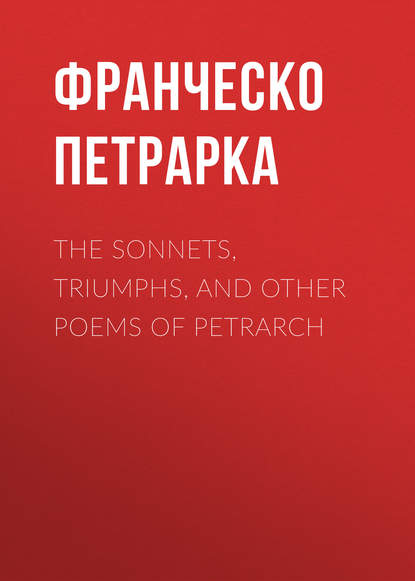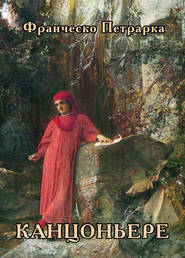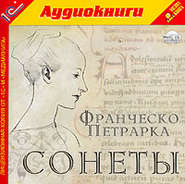По всем вопросам обращайтесь на: info@litportal.ru
(©) 2003-2025.
✖
The Sonnets, Triumphs, and Other Poems of Petrarch
Настройки чтения
Размер шрифта
Высота строк
Поля
All naked else; and round about his chair
Were thousand mortals: some in battle ta'en,
Many were hurt with darts, and many slain.
Glad to learn news, I rose, and forward press'd
So far, that I was one amongst the rest;
As if I had been kill'd with loving pain
Before my time; and looking through the train
Of this tear-thirsty king, I would have spied
Some of my old acquaintance, but descried
No face I knew: if any such there were,
They were transform'd with prison, death, and care.
At last one ghost, less sad than th' others, came,
Who, near approaching, call'd me by my name,
And said: "This comes of Love." "What may you be,"
I answer'd, wondering much, "that thus know me?
For I remember not t' have seen your face."
He thus replied: "It is the dusky place
That dulls thy sight, and this hard yoke I bear:
Else I a Tuscan am; thy friend, and dear
To thy remembrance." His wonted phrase
And voice did then discover what he was.
So we retired aside, and left the throng,
When thus he spake: "I have expected long
To see you here with us; your face did seem
To threaten you no less. I do esteem
Your prophesies; but I have seen what care
Attends a lover's life; and must beware."
"Yet have I oft been beaten in the field,
And sometimes hurt," said I, "but scorn'd to yield."
He smiled and said: "Alas! thou dost not see,
My son, how great a flame's prepared for thee."
I knew not then what by his words he meant:
But since I find it by the dire event;
And in my memory 'tis fix'd so fast,
That marble gravings cannot firmer last.
Meanwhile my forward youth did thus inquire:
"What may these people be? I much desire
To know their names; pray, give me leave to ask."
"I think ere long 'twill be a needless task,"
Replied my friend; "thou shalt be of the train,
And know them all; this captivating chain
Thy neck must bear, (though thou dost little fear,)
And sooner change thy comely form and hair,
Than be unfetter'd from the cruel tie,
Howe'er thou struggle for thy liberty;
Yet to fulfil thy wish, I will relate
What I have learn'd. The first that keeps such state,
By whom our lives and freedoms we forego,
The world hath call'd him Love; and he (you know,
But shall know better when he comes to be
A lord to you, as now he is to me)
Is in his childhood mild, fierce in his age;
'Tis best believed of those that feel his rage.
The truth of this thou in thyself shalt find,
I warn thee now, pray keep it in thy mind.
Of idle looseness he is oft the child;
With pleasant fancies nourish'd, and is styled
Or made a god by vain and foolish men:
And for a recompense, some meet their bane;
Others, a harder slavery must endure
Than many thousand chains and bolts procure.
That other gallant lord is conqueror
Of conquering Rome, led captive by the fair
Egyptian queen, with her persuasive art,
Who in his honours claims the greatest part;
For binding the world's victor with her charms,
His trophies are all hers by right of arms.
The next is his adoptive son, whose love
May seem more just, but doth no better prove;
For though he did his lovèd Livia wed,
She was seducèd from her husband's bed.
Nero is third, disdainful, wicked, fierce,
And yet a woman found a way to pierce
His angry soul. Behold, Marcus, the grave
Wise emperor, is fair Faustina's slave.
These two are tyrants: Dionysius,
And Alexander, both suspicious,
And yet both loved: the last a just reward
Found of his causeless fear. I know y' have heard
Of him, who for Creüsa on the rock
Antandrus mourn'd so long; whose warlike stroke
At once revenged his friend and won his love:
And of the youth whom Phædra could not move
T' abuse his father's bed; he left the place,
And by his virtue lost his life (for base
Unworthy loves to rage do quickly change).
It kill'd her too; perhaps in just revenge
Of wrong'd Theseus, slain Hippolytus,
And poor forsaken Ariadne: thus
It often proves that they who falsely blame
Another, in one breath themselves condemn:
And who have guilty been of treachery,
Need not complain, if they deceivèd be.
Behold the brave hero a captive made
With all his fame, and twixt these sisters led:
Who, as he joy'd the death of th' one to see,
His death did ease the other's misery.
The next that followeth, though the world admire
His strength, Love bound him. Th' other full of ire
Is great Achilles, he whose pitied fate
Were thousand mortals: some in battle ta'en,
Many were hurt with darts, and many slain.
Glad to learn news, I rose, and forward press'd
So far, that I was one amongst the rest;
As if I had been kill'd with loving pain
Before my time; and looking through the train
Of this tear-thirsty king, I would have spied
Some of my old acquaintance, but descried
No face I knew: if any such there were,
They were transform'd with prison, death, and care.
At last one ghost, less sad than th' others, came,
Who, near approaching, call'd me by my name,
And said: "This comes of Love." "What may you be,"
I answer'd, wondering much, "that thus know me?
For I remember not t' have seen your face."
He thus replied: "It is the dusky place
That dulls thy sight, and this hard yoke I bear:
Else I a Tuscan am; thy friend, and dear
To thy remembrance." His wonted phrase
And voice did then discover what he was.
So we retired aside, and left the throng,
When thus he spake: "I have expected long
To see you here with us; your face did seem
To threaten you no less. I do esteem
Your prophesies; but I have seen what care
Attends a lover's life; and must beware."
"Yet have I oft been beaten in the field,
And sometimes hurt," said I, "but scorn'd to yield."
He smiled and said: "Alas! thou dost not see,
My son, how great a flame's prepared for thee."
I knew not then what by his words he meant:
But since I find it by the dire event;
And in my memory 'tis fix'd so fast,
That marble gravings cannot firmer last.
Meanwhile my forward youth did thus inquire:
"What may these people be? I much desire
To know their names; pray, give me leave to ask."
"I think ere long 'twill be a needless task,"
Replied my friend; "thou shalt be of the train,
And know them all; this captivating chain
Thy neck must bear, (though thou dost little fear,)
And sooner change thy comely form and hair,
Than be unfetter'd from the cruel tie,
Howe'er thou struggle for thy liberty;
Yet to fulfil thy wish, I will relate
What I have learn'd. The first that keeps such state,
By whom our lives and freedoms we forego,
The world hath call'd him Love; and he (you know,
But shall know better when he comes to be
A lord to you, as now he is to me)
Is in his childhood mild, fierce in his age;
'Tis best believed of those that feel his rage.
The truth of this thou in thyself shalt find,
I warn thee now, pray keep it in thy mind.
Of idle looseness he is oft the child;
With pleasant fancies nourish'd, and is styled
Or made a god by vain and foolish men:
And for a recompense, some meet their bane;
Others, a harder slavery must endure
Than many thousand chains and bolts procure.
That other gallant lord is conqueror
Of conquering Rome, led captive by the fair
Egyptian queen, with her persuasive art,
Who in his honours claims the greatest part;
For binding the world's victor with her charms,
His trophies are all hers by right of arms.
The next is his adoptive son, whose love
May seem more just, but doth no better prove;
For though he did his lovèd Livia wed,
She was seducèd from her husband's bed.
Nero is third, disdainful, wicked, fierce,
And yet a woman found a way to pierce
His angry soul. Behold, Marcus, the grave
Wise emperor, is fair Faustina's slave.
These two are tyrants: Dionysius,
And Alexander, both suspicious,
And yet both loved: the last a just reward
Found of his causeless fear. I know y' have heard
Of him, who for Creüsa on the rock
Antandrus mourn'd so long; whose warlike stroke
At once revenged his friend and won his love:
And of the youth whom Phædra could not move
T' abuse his father's bed; he left the place,
And by his virtue lost his life (for base
Unworthy loves to rage do quickly change).
It kill'd her too; perhaps in just revenge
Of wrong'd Theseus, slain Hippolytus,
And poor forsaken Ariadne: thus
It often proves that they who falsely blame
Another, in one breath themselves condemn:
And who have guilty been of treachery,
Need not complain, if they deceivèd be.
Behold the brave hero a captive made
With all his fame, and twixt these sisters led:
Who, as he joy'd the death of th' one to see,
His death did ease the other's misery.
The next that followeth, though the world admire
His strength, Love bound him. Th' other full of ire
Is great Achilles, he whose pitied fate














